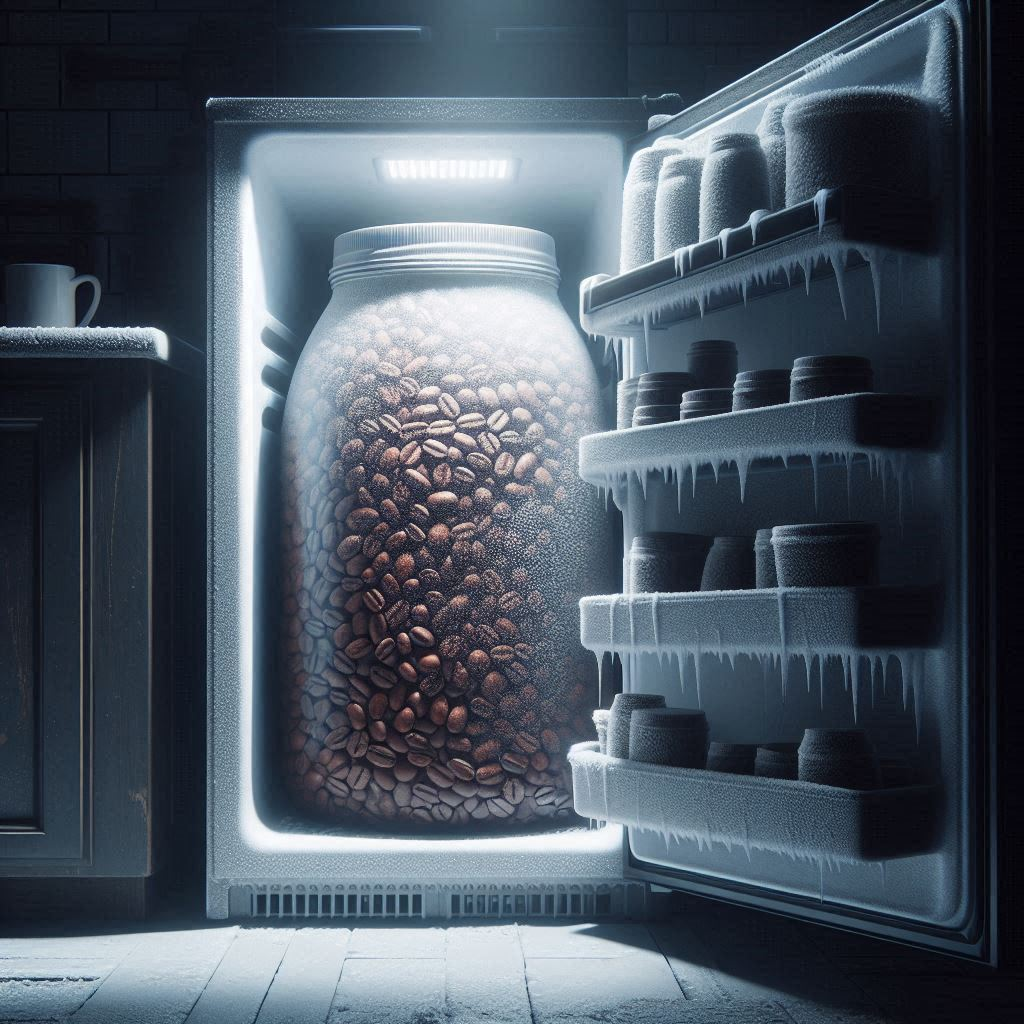Coffee lovers often find themselves pondering the best ways to preserve their precious beans. Among these methods, freezing coffee beans has sparked considerable debate. Did you know that properly frozen coffee beans can maintain their flavor for up to two years? This surprising fact leads us to explore a question that many coffee enthusiasts grapple with: Should I freeze coffee beans?
For those who cherish every sip of their morning brew, understanding the impact of freezing on coffee beans is crucial. This article delves into the science, benefits, and potential drawbacks of this preservation method. We’ll explore how freezing affects the complex flavors and aromas that make each cup of coffee unique.
By the end of this article, you’ll have a comprehensive understanding of whether freezing coffee beans is the right choice for you. We’ll examine expert opinions, scientific research, and practical considerations to help you make an informed decision about storing your coffee. Whether you’re a casual drinker or a dedicated connoisseur, this guide will equip you with the knowledge to optimize your coffee storage and ensure every cup is as fresh and flavorful as possible.
Roots of the Roast
The practice of freezing coffee beans has its roots in the quest for preserving freshness. Coffee, like many organic products, begins to lose its quality soon after roasting due to a process called oxidation. This natural degradation affects the complex flavors and aromas that coffee enthusiasts cherish.
Historically, coffee was stored in cool, dark places to slow this process. As refrigeration technology became widespread in the 20th century, the idea of freezing coffee beans emerged as a potential solution for long-term storage. The concept gained traction among both consumers and some coffee professionals who saw it as a way to extend the shelf life of their precious beans.
The relevance of this topic stems from the growing specialty coffee movement. As more consumers develop a taste for high-quality, freshly roasted coffee, the question of how to preserve these beans becomes increasingly important. Specialty coffee often comes with a higher price tag, making proper storage crucial to protect the investment and ensure optimal flavor.
Understanding whether to freeze coffee beans is particularly relevant for:
- Home baristas who buy coffee in bulk
- Coffee enthusiasts who enjoy a variety of beans but consume them slowly
- Roasters and cafes managing inventory
- Travelers who want to bring back coffee from distant locations
The science behind freezing coffee beans involves complex chemical processes. When coffee is roasted, it undergoes significant changes, producing oils and gases that contribute to its flavor profile. These compounds continue to evolve after roasting, which is why freshly roasted coffee is often preferred. The freezing process aims to halt or significantly slow this evolution, theoretically preserving the coffee’s peak flavor.
As we explore this topic further, we’ll examine how effective freezing truly is in maintaining coffee quality and whether the potential benefits outweigh any drawbacks. This knowledge is essential for anyone looking to optimize their coffee experience and make informed decisions about storing their favorite beans.
The Full Brewdown
The Science of Freezing Coffee Beans
To understand whether you should freeze coffee beans, it’s crucial to examine the science behind this practice. When coffee beans are frozen, several processes occur:
- Moisture Control: Freezing can help prevent moisture absorption, which is a primary cause of flavor degradation in coffee.
- Chemical Reaction Slowdown: Low temperatures significantly slow down the chemical reactions that lead to flavor loss.
- CO2 Retention: Freezing may help retain more carbon dioxide in the beans, which is essential for preserving freshness and flavor.
Research conducted by the University of Bath in 2020 found that freezing coffee beans before grinding them resulted in a more uniform grind size, potentially leading to better extraction and flavor. This study suggests that there might be benefits to freezing coffee beans beyond mere preservation.
Pros of Freezing Coffee Beans
- Extended Shelf Life: Properly frozen coffee beans can maintain their quality for several months to a year, far longer than beans stored at room temperature.
- Preservation of Volatile Compounds: The cold temperatures help lock in the aromatic oils and gases that contribute to coffee’s complex flavor profile.
- Bulk Buying: Freezing allows coffee enthusiasts to take advantage of sales or bulk purchases without worrying about the beans going stale.
- Seasonal Coffee Storage: For those who enjoy limited edition or seasonal coffees, freezing provides a way to enjoy these special beans throughout the year.
Cons of Freezing Coffee Beans
- Potential Moisture Damage: If not properly sealed, coffee beans can absorb moisture from the freezer, leading to flavor degradation.
- Thawing Issues: Repeatedly thawing and refreezing beans can cause condensation, potentially damaging the coffee’s quality.
- Loss of Nuanced Flavors: Some experts argue that freezing can dull the more subtle flavor notes in high-quality, specialty coffees.
- Inconvenience: The process of properly freezing and thawing beans can be time-consuming and requires careful attention to detail.
Best Practices for Freezing Coffee Beans
If you decide to freeze coffee beans, follow these guidelines to maximize preservation:
- Use Airtight Containers: Store beans in vacuum-sealed bags or airtight containers to prevent moisture absorption and freezer burn.
- Portion Control: Divide beans into smaller portions before freezing to avoid repeated thawing and refreezing.
- Cool Before Freezing: Allow freshly roasted beans to de-gas for a few days before freezing to preserve optimal flavor.
- Avoid Glass Containers: Glass can crack in the freezer, so opt for plastic or metal containers instead.
- Label and Date: Clearly mark containers with the type of coffee and freezing date to track freshness.
Thawing Process
Proper thawing is crucial when you freeze coffee beans:
- Remove only the amount you plan to use within 1-2 weeks.
- Allow the beans to come to room temperature in their sealed container (about 1-2 hours) before opening to prevent condensation.
- Once thawed, store the beans in an airtight container at room temperature and use within two weeks.
Expert Opinions
Opinions on freezing coffee beans vary among industry professionals:
- James Hoffmann, World Barista Champion and coffee expert, suggests that freezing can be effective for preserving coffee but emphasizes the importance of proper sealing and thawing.
- Scott Rao, coffee consultant and author, advocates for freezing coffee beans, particularly for espresso, citing improved grind consistency and flavor preservation.
- Trish Rothgeb, director of Q and educational programs at the Coffee Quality Institute, cautions against freezing, arguing that it can dull flavors and alter the coffee’s character.
Alternative Storage Methods
While freezing is one option, consider these alternatives:
- Vacuum Sealing: Removing air from storage bags can significantly extend shelf life without freezing.
- Nitrogen Flushing: Some specialty roasters offer nitrogen-flushed bags, which replace oxygen with inert nitrogen to preserve freshness.
- Ceramic Containers: These can protect beans from light and maintain a stable temperature.
When to Consider Freezing
Freezing coffee beans might be particularly beneficial in certain situations:
- You’ve purchased more coffee than you can consume within a month.
- You want to preserve a special or limited edition coffee.
- You’re leaving for an extended period and want to keep your coffee fresh.
When to Avoid Freezing
On the other hand, freezing might not be necessary or advisable if:
- You consume coffee quickly (within 2-4 weeks of roasting).
- You have easy access to freshly roasted beans.
- You prioritize experiencing the evolving flavors of coffee as it ages.
For those seeking a premium coffee experience without the need to freeze, consider trying Ghostly Gold Coffee from Phantom Roast. This carefully roasted blend is designed to maintain its peak flavor for several weeks when stored properly at room temperature, offering a balance of convenience and quality.
Ultimately, the decision to freeze coffee beans depends on your personal preferences, consumption habits, and the specific characteristics of the coffee you enjoy. By understanding the science and best practices behind freezing coffee beans, you can make an informed choice that enhances your coffee experience and ensures you always have access to flavorful, aromatic brews.
Practical Tips and Recommendations
To maximize the benefits of freezing coffee beans, consider these actionable tips:
- Portion Control:
- Divide your coffee into weekly portions before freezing.
- Use small, airtight containers or resealable freezer bags.
- Example: If you use 250g of coffee per week, create individual 250g portions.
- Proper Sealing:
- Remove as much air as possible from storage containers.
- For bags, use the water displacement method: submerge the sealed bag in water up to the zip line, forcing out air before sealing completely.
- Labeling System:
- Mark each container with:
- Coffee origin and roast date
- Date of freezing
- Expected use-by date (up to 3 months for optimal flavor)
- Mark each container with:
- Strategic Freezing:
- Freeze beans at their peak freshness, typically 3-10 days after roasting.
- For a continuous supply, rotate your frozen stock: use the oldest while freezing new batches.
- Thawing Technique:
- Remove frozen beans the night before use.
- Keep the container sealed until it reaches room temperature to prevent condensation.
- Grind Frozen Beans:
- For even better results, grind beans while still frozen.
- This technique can lead to a more uniform grind size and potentially better extraction.
- Quality Check:
- Conduct a taste test: freeze a portion of your favorite beans and compare with unfrozen beans after a month.
- This personal experiment will help you decide if freezing works for your palate.
- Consider Bean Type:
- Darker roasts generally freeze better due to lower moisture content.
- For lighter roasts, like Morning Mist Coffee, freezing might help preserve their delicate flavors longer.
- Freezer Setup:
- Store coffee away from strong-smelling foods to prevent flavor contamination.
- Use a dedicated freezer drawer or container for coffee storage if possible.
By implementing these practical tips, you can effectively freeze coffee beans and maintain their quality over time. Experiment with these methods to find the best approach for your coffee routine and preferences.
Common Misconceptions
Several myths surround the practice of freezing coffee beans:
- Myth: Freezing coffee beans ruins their flavor.
Fact: When done properly, freezing can preserve flavor. The key is proper storage and thawing techniques. - Myth: All moisture is bad for frozen coffee beans.
Fact: While excess moisture is harmful, coffee beans naturally contain oils essential for flavor. Proper freezing preserves these oils. - Myth: Frozen coffee beans can be used immediately after removal from the freezer.
Fact: Allowing frozen beans to reach room temperature before opening the container prevents condensation and maintains quality. - Myth: Freezing coffee beans eliminates the need for fresh roasts.
Fact: While freezing extends shelf life, it doesn’t indefinitely preserve freshness. Frozen beans are best used within 3-6 months. - Myth: All coffee beans benefit equally from freezing.
Fact: Different roasts and origins may respond differently to freezing. Dark roasts typically freeze better than light roasts. - Myth: Freezing coffee beans is always necessary for long-term storage.
Fact: For coffee consumed within 2-4 weeks of roasting, proper room temperature storage in an airtight container is often sufficient.
Understanding these facts about freezing coffee beans helps coffee enthusiasts make informed decisions about their bean storage methods.
Final Thoughts
Freezing coffee beans can be an effective method for preserving freshness and flavor when done correctly. Throughout this article, we’ve explored the science behind freezing coffee, weighing its pros and cons, and discussing best practices for implementation.
Key takeaways include:
- Proper storage in airtight containers is crucial
- Portioning beans before freezing prevents repeated thawing
- Allowing frozen beans to reach room temperature before opening preserves quality
- Freezing is most beneficial for long-term storage beyond 1-2 months
While freezing offers benefits, it’s not always necessary. For those who consume coffee within a few weeks of roasting, proper room temperature storage may suffice. The decision to freeze coffee beans ultimately depends on individual consumption habits and preferences.
To determine if freezing works for you, conduct your own experiment. Freeze a portion of your favorite beans and compare them to freshly roasted ones after a month. This hands-on approach will help you decide whether freezing aligns with your coffee goals.
For those seeking consistently fresh coffee without the need for freezing, explore options like Demon’s Delight Coffee, which is roasted in small batches to ensure peak flavor upon delivery.
Whichever method you choose, prioritize quality and freshness to elevate your coffee experience.




